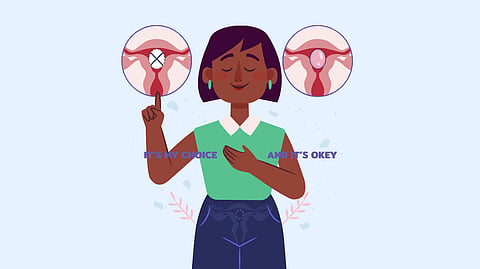

NEW DELHI: Despite being more vocal, young adults, primarily men and from rural areas with less education, are still not comfortable discussing abortion and are more conservative about unmarried girls going ahead with ending their pregnancy, according to a nationwide survey.
Interestingly, the survey, conducted for the first time in the country, showed that while most women support women’s autonomy in decision-making, a significant majority of both genders disagree that they should be the primary decision-makers.
Women are also more supportive of a single girl terminating their pregnancy as compared to men, according to the survey.
The nationwide survey released on Tuesday was conducted by the Ipas Development Foundation (IDF), a not-for-profit organisation that focusses on enhancing women and girls' access to safe, respectful, and non-judgemental sexual and reproductive health services.
Surprisingly, people aged 32 years and above were significantly more comfortable conversing about abortion with friends and family members compared to younger people in the age group of 18–24 years, who are, however, supportive of abortion in general.
The pan-India survey, which received 13,255 responses, with 59 percent being women, showed that over seven in ten respondents (71 percent) have a positive attitude towards abortion. However, this decreases to 62 percent when it comes to abortion for an unmarried person.
While the majority (72 percent) said that abortion should be allowed in the country, only one-third did not favour abortion, and 11 percent expressed their unsureness.
Also, 70 percent said they are at ease discussing abortion with friends, and 65 percent reported similar comfort levels when talking about it with family members.
“Women are significantly more likely to support abortion for unmarried persons as compared to men. Education also plays a significant role in influencing attitudes towards abortion,” the study said.
Most participants, in the age group of 18 to 46 years, held a higher secondary education qualification (23 percent), followed by graduates (21 percent), while 4 percent reported no formal education.
“In India, an estimated 15.6 million abortions occur each year. Abortions account for about one-third of all pregnancies. Despite being so common, abortion remains a largely unspoken topic,” Sushanta K. Banerjee, Chief Technical Officer, Research and Evaluation, IDF, told TNIE.
“We hope these findings act as a catalyst for initiating open dialogue and fostering a shift towards greater acceptance of abortion as a fundamental right for women,” he added.
On teenage girls seeking abortions at illegal clinics, Vinoj Manning, Chief Executive Officer of IDF, said, “The real question is, what are we, as a society, doing that drives them to these unsafe options? We need to start by recognising and committing to the idea that teenage girls have a fundamental right to their bodily autonomy and reproductive choices. From there, it becomes crucial for society, the legal and policy frameworks, and health systems to ensure that these girls can access non-judgemental abortion care.”
This means actively working to reduce stigma, training healthcare providers to offer compassionate, unbiased care, and increasing awareness and knowledge of sexual and reproductive health among teenagers and their caregivers in families and communities.
“By addressing these areas, we can create an environment where teenage girls feel safe and supported in accessing the care they need,” Manning added.
He added that over 30 percent of people still believe abortion is illegal in India, even though abortion in India has been legal since 1971 under relatively progressive legal provisions, allowing women to access abortions for various reasons up to 24 weeks of pregnancy.
“Our law is more liberal and empowering compared to many other countries. However, abortion is not fully recognised as an unconditional right; it is permitted only under specific conditions,” he told TNIE.
The misconception that abortion is illegal limits access to accurate information, quality services, and non-judgmental, stigma-free care.
“To address this gap, we need to focus on increasing public awareness, providing clear and accurate information, and dispelling myths about abortion. This will help ensure that women can access the safe and respectful abortion services that they are entitled to,” he added.